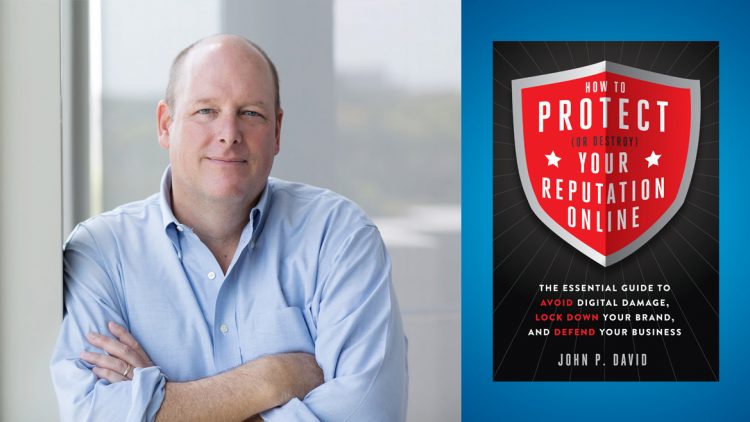3 Questions For is an ongoing series of quick sketch interviews with notable presenters at MDC events.
For more than 25 years, John P. David has counseled businesses and executives on strategic communications and marketing issues, from simple publicity campaigns to how to extract a business from the clutches of a multimillion-dollar Ponzi scheme. His strategic communications firm, David PR Group, counsels clients in the areas of marketing, reputation management, and public relations. He frequently writes about communications and strategy for his award-winning blog, and his insights are regularly published on the Huffington Post. How to Protect (or Destroy) Your Reputation Online: The Essential Guide to Avoid Digital Damage, Lock Down Your Brand, and Defend Your Business(Career Press) is an indispensable guidebook for individuals and businesses, offering in-depth information about popular review sites like Yelp, TripAdvisor, and Angie’s List. John also shows you how to deal with revenge porn, hate blogs, Google’s “right to be forgotten” in Europe, the business of online complaint sites, even the covert ops of reputation management.
Gabriel Riera: What top 3 pieces of advice would you give anyone in order to protect their online rep?
John P. David: 1. Understand that your online reputation is important. You will be Googled and your social media profiles will be searched at critical junctures for the rest of your life, such as when applying for your first job or joining organizations that help your career. Many prospective employers are specifically viewing search results with the intention of finding reasons not to hire you. Take your online reputation seriously.
“Nothing good can come from sending naked pictures of yourself.”
2. Think before you post. Whenever you tweet, post or e-mail, the message has the potential to be misconstrued and cause damage. Stop and think before you publish information, particularly if you are angry or feeling emotional. Such conversations are usually better when done in person or over the phone. In addition, resist the urge to digitally document everything in your life, and certainly stop and think before posting about other people’s failings. We all have bad days, and none of us needs a meltdown or embarrassing moment to be publicized.
3. Please, PLEASE, stop sending and posting pictures of your private parts. This is a strange epidemic. Nothing good can come from sending naked pictures of yourself. We need to resist the urge to take naked pictures of ourselves, and we need to stop asking it of others.
GR: Are students/millennials more vulnerable, more savvy, or about the same as the rest of the public when it comes to managing their online profiles? Any special advice for them?
JPD: Students benefit from being exposed to these lessons and hearing advice like this, but they are also the most vulnerable because they spend so much time online. I also warn against the feeling of invincibility that some young people have because they think you can outsmart everyone – with secret screen names, private profiles and by using sites like Snapchat. No technical or clever solution is fool proof. Young people often lack the life experiences necessary to make the best decisions. This is not meant as a knock because I know how smart young people are — I have two teenagers who remind me all the time. But you have to learn how to be extra vigilant given the amount of time spent using online apps and the internet.
GR: If you were king of the internet, what would you change?
JPD: If I were king, I would make my book required reading. Just kidding. I would like to help the people who are truly victims of online reputation attacks. Many of the online nightmares (and I talk about them in my book) have to do with people doing dumb things and getting into trouble. However, many people are victims of online attacks or are in the wrong place at the wrong time, and they end up with big online problems. I wish I could help more of them solve their problems.
John P. David talks about his book at Miami Book Fair
Sun. Nov 20, 10am, Room 7106
Building 7, 1st Floor
300 N.E. Second Ave.
Miami, FL 33132
